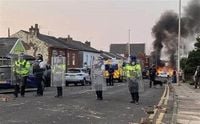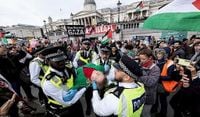On October 6, 2025, the United Kingdom found itself at the crossroads of protest rights and public order, as the government unveiled a controversial proposal to strengthen police powers over repeat demonstrations. The move comes in the wake of escalating tensions between protest groups, law enforcement, and communities—particularly after a high-profile pro-Palestinian march in London resulted in nearly 500 arrests just days earlier, as reported by multiple outlets including News Today.
The heart of the government’s plan lies in amendments to Sections 12 and 14 of the Public Order Act 1986. These changes would explicitly permit police to impose stringent conditions—such as relocation, time limits, and crowd size caps—on protests that have sparked repeated disorder. According to the UK Home Office, senior officers will soon be empowered to take into account the "cumulative impact" of previous protest activity when deciding how to manage future demonstrations. If a protest has occurred at the same site for weeks on end and caused repeated disruptions, police will be authorized to instruct organizers to move the event elsewhere. Any breach of these new conditions could lead to arrest and prosecution.
Home Secretary Shabana Mahmood has been at the forefront of the initiative, emphasizing the need to strike a delicate balance between the fundamental right to protest and the safety and well-being of local communities. In a statement released by the Home Office and quoted by News Today, Mahmood asserted, "The right to protest is a fundamental freedom in our country. However, this freedom must be balanced with the freedom of their neighbours to live their lives without fear." She continued, "These changes mark an important step in ensuring we protect the right to protest while ensuring all feel safe in this country."
Mahmood’s comments reflect growing concerns among religious communities, particularly the British Jewish community, who have reported feeling unsafe amid ongoing demonstrations and a recent terrorist attack on a Manchester synagogue. Mahmood noted, "Large, repeated protests can leave sections of our country, particularly religious communities, feeling unsafe, intimidated and scared to leave their homes. This has been particularly evident in relation to the considerable fear within the Jewish community, which has been expressed to me on many occasions in these recent difficult days."
The government’s proposals are not occurring in a vacuum. The announcement comes after Mahmood and Prime Minister Keir Starmer publicly urged organizers of the October 4 pro-Palestinian protest to reconsider their plans in light of the attack on the synagogue, which took place on Yom Kippur. In the aftermath, Mahmood wrote to England’s Chief Constables to commend their "swift and professional response" and encouraged them to use the "full range of powers" at their disposal to prevent and respond to public disorder, as detailed by the Home Office.
Alongside the proposed amendments to the Public Order Act, the government is reviewing existing legislation to ensure that police powers are both sufficient and consistently applied. This review extends to the Crime and Policing Bill currently making its way through Parliament. The bill contains a suite of new measures designed to bolster police authority at protests, including banning the possession of fireworks, flares, and other pyrotechnics; criminalizing the climbing of specified war memorials; and prohibiting the use of face coverings to conceal identity at protests designated by police.
These moves have been met with a chorus of concern from civil liberties organizations and activists. Groups such as Liberty and Amnesty International argue that the new powers could suppress legitimate dissent and infringe upon democratic freedoms. According to News Today, Defend Our Juries, a campaign group, has pledged mass disobedience in November, labeling the government’s actions as an "extraordinary affront to democracy." The group’s planned response underscores the depth of opposition among those who see the proposals as an overreach that threatens the very foundation of democratic engagement in the UK.
For civil liberties advocates, the core issue is whether the government’s approach will tip the scales too far in favor of public order at the expense of the right to protest. Liberty and Amnesty International have voiced fears that the measures could be used to stifle dissent, particularly against unpopular or controversial government policies. Their argument is straightforward: while public safety is paramount, the right to assemble and voice opposition is a cornerstone of a healthy democracy.
On the other side of the debate, police chiefs and some community leaders have been calling for additional powers for months, especially amid ongoing protests related to the Israel-Hamas conflict in the Middle East. These demonstrations have frequently led to clashes between police and protesters, resulting in a significant number of arrests and raising questions about the adequacy of current policing tools. Supporters of the government’s plan contend that repeated, large-scale protests can disrupt daily life, intimidate residents, and pose genuine risks to public safety—particularly for vulnerable groups.
The government’s review also includes the possibility of banning protests outright in certain circumstances, though such measures are expected to be used sparingly. The Home Office has stressed that any new powers will be carefully calibrated to ensure that fundamental rights are protected, even as authorities seek to address the "cumulative impact" of persistent protest activity on local communities.
The proposed legislation has sparked a lively debate within Parliament and beyond, with lawmakers, community leaders, and advocacy groups weighing in from all sides. While some MPs have praised the government’s efforts to respond to recent events and protect vulnerable communities, others have warned against the dangers of eroding civil liberties in the name of security. The Crime and Policing Bill’s progress is being closely watched, as its provisions could set the tone for how protests are managed in the UK for years to come.
As the government moves forward with its proposals, the tension between safeguarding public order and upholding the right to protest remains unresolved. With mass disobedience campaigns on the horizon and civil liberties groups vowing to fight the changes, the coming weeks are likely to see further clashes—both on the streets and in the halls of power.
For many Britons, the debate is more than just a legal or political issue; it strikes at the very core of what it means to live in a free society. As the UK charts its course through these turbulent waters, the challenge will be to find a path that protects both safety and the cherished right to dissent—no easy feat in a democracy under strain.


